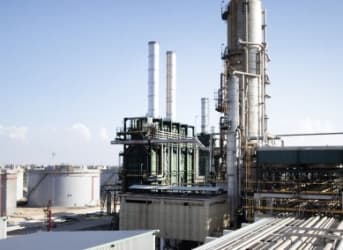TRIPOLI—The battle for control over Libya is the battle to control Libya’s oil wealth, and it reached its climax on 7 April when the National Oil Corporation (NOC) in Benghazi put its full backing behind the new UN-backed government in neighboring Tunisia.
On Thursday, the NOC addressed a letter to the Fayez Serraj, head of the United Nations-backed Presidency Council, informing him that all oil revenues collected by the NOC would be sent to the new Council’s approved bank account in what amounts to official recognition of Libya’s new unity government.
This is a major victory for the new UN-backed government, because the NOC in Benghazi had supported the Libya’s Parliament in Tobruk, in the country’s eastern region. And now that it has secured the commitment of the NOC to hand over the country’s oil revenues, there is an emerging positivism that business may be able to move forward.
But it could also erupt in civil war at any moment. After all, we’re looking at three governments here: The Tunis-based, UN-backed unity government with its Presidency Council (PC); the Islamist-leaning government that controls the capital, Tripoli; and the internationally recognized government based in the east, in the city of Tobruk. The assumption is that because the Benghazi NOC has thrown its support behind the Presidency Council, the government in Tobruk will, too. But that’s not official yet, and it’s not necessarily a smooth process. And the Islamists are still hedging their bets in Tripoli. Related: Are The Saudis And Russians Deliberately Sabotaging Doha?
This is the end game now, and it’s all about who wins the legitimacy to sell Libya’s oil. With the NOC backing it, the new government has money behind its international legitimacy, but it still holds no sway in the capital, Tripoli. There has been no official meeting to anyone’s knowledge between PC head Serraj and the NOC in Tripoli and no official contact prior to Thursday’s letter.
The Islamist-leaning National Salvation Government and its militia allies have controlled Tripoli and most of western Libya since mid-2014. The New Presidency Council head, Serraj, has been in Tripoli since 31 March, having arrived by sea (the only way he could get through the Islamist front lines, so to speak).
Since his arrival, Serraj has met with many government officials, including Central bank of Libya (CBL) Governor Sediq Al-Kabir, all managers of commercial banks in Tripoli, up to 25 municipal mayors and key NGO activists, but no indications of any meetings with the chairman of the NOC in Tripoli, Moustafa Sanah Alaah.
Tripoli remains a tinder box.
The Islamist National Salvation Government headed by Khalifa Ghwell in Tripoli last week said he would resign; however, now he seems to have reversed his decision, declaring that his government was still functioning, and warning all government institutions against dealing with the Presidency Council. But the new Presidency Council has already started to make significant gains in Tripoli, picking up momentum through the support of the NOC in Benghazi, Libya’s second largest city. Related: Oil Stages Comeback On Bullish EIA Data
Beyond control of the oil, there is yet another military situation that is proving problematic. The two key military leaders—General Khalifa Hafter, Supreme Commander of the Libyan National Army (LNA) assigned by the Parliament in Tobruk, and Ibrahim Jadran, commander of the Petroleum Facilities Guards (PFG)—do not enjoy good relations.
Earlier on, PFG Commander Jadran had declared his support for the new Presidency Council. But Hafter is wobbling and clearly trying to hedge his bets before he commits to one or another side.
In the meantime, one of the military brigades controlling Libya’s main oil fields announced earlier this week that they will only take orders from General Hafter, whose allegiance remains unclear. Haftar has vowed not to let the situation cross over into another civil war, but has suggested that the Presidency Council obtain official legitimacy from the parliament in Tobruk. That legitimacy, apparently, is all Haftar would need to throw in his own support. Related: Huge Fire Erupts at ExxonMobil Refinery Near Houston
In this process, a few more stones are being turned over much to the discomfort of the oil sector in Libya. And anyone caught on the wrong side of history in this conflict may have a price to pay as the newly put together UN-backed government makes its final bid for full control.
The letter was signed by NOC Benghazi Chairman Naji Al-Mughrabi and also takes some time to complain about the actions of international oil trader and Swiss mining giant Glencore Plc, which struck a deal with the government in Tripoli late last year. Mughrabi complains that Glencore uses unacceptable methods to get Libyan oil—namely, he said, by supporting the anti-Libyan oil corporation based in Tripoli. The NOC chairman describes Glencore’s activities as blatant interference in Libya’s sovereignty.
ADVERTISEMENT
For oil investors, this is D-Day for Libya and Libyan oil, and next week could bring us either closer to a unity government victory or closer to civil war. On Monday, the Parliament in Tobruk is scheduled to hold a session on whether or not to approve the Presidency Council’s government headed by Serraj.
By Moutaz Ali for Oilprice.com
More Top Reads From Oilprice.com:
- How Realistic Is Saudi Arabia’s $2 Trillion Sovereign Wealth Fund?
- Why Natural Gas Prices Could Double From Here
- Shocking Photo: Nearly 30 Oil Tankers in Traffic Jam Off Iraqi Coast


















